Every person has empathy toward those who are closest. The challenge is to rise from having empathy for a few to having empathy for many. Our distracted society often does not allow the time for the cultivation of reflection and imagination so that we can put ourselves into the shoes of others distant or different from ourselves, especially those who suffer most.– Rev. John J. Strynkowski, “In Their Shoes,”America: The Jesuit Review
Parents worry about their children’s health, safety, and well-being. The American people do too.
In a recent poll, the Kaiser Family Foundation found that 88 percent of Americans believe that it should be a top or important priority of Congress to reauthorize funding for the Children’s Health Insurance Program (CHIP).
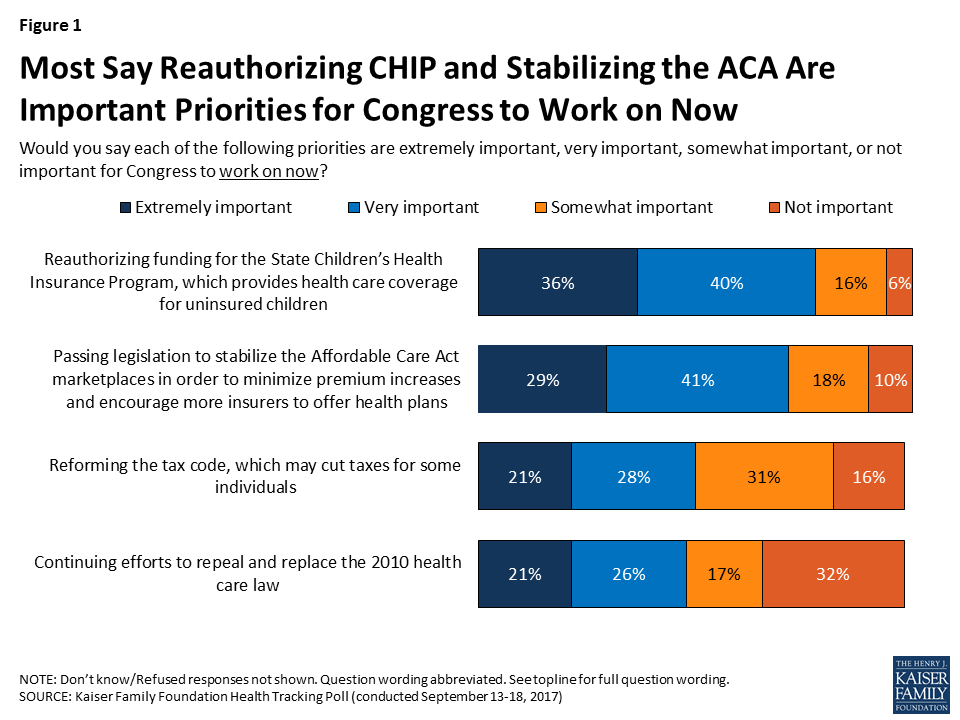
Unfortunately, our nation’s political leadership does not exhibit the same concern. In September, Congress and President Trump allowed funding for CHIP to expire, and today their inaction during this holiday season threatens the health coverage of nearly nine million children and pregnant women.
While Congress dithers and fails to do its job, Jimmy Kimmel called out policymakers last week for their lack of support and attention for children.
This is not the first time Kimmel has spoken out on children’s health. Back in May, Kimmel went on his show Jimmy Kimmel Live! to talk about how his son faced a life-threatening heart condition at birth. Kimmel recognized how fortunate he was to have comprehensive health coverage for his son, but his compassion and empathy extended to other families he saw in the hospital worrying about the health of their children.
As Kimmel said, “I saw a lot of families there. And no parent should have to decide if they can afford to save their child’s life. It just shouldn’t happen.” Kimmel went on to make the case that health reform should improve and never threaten the health and well-being of children.
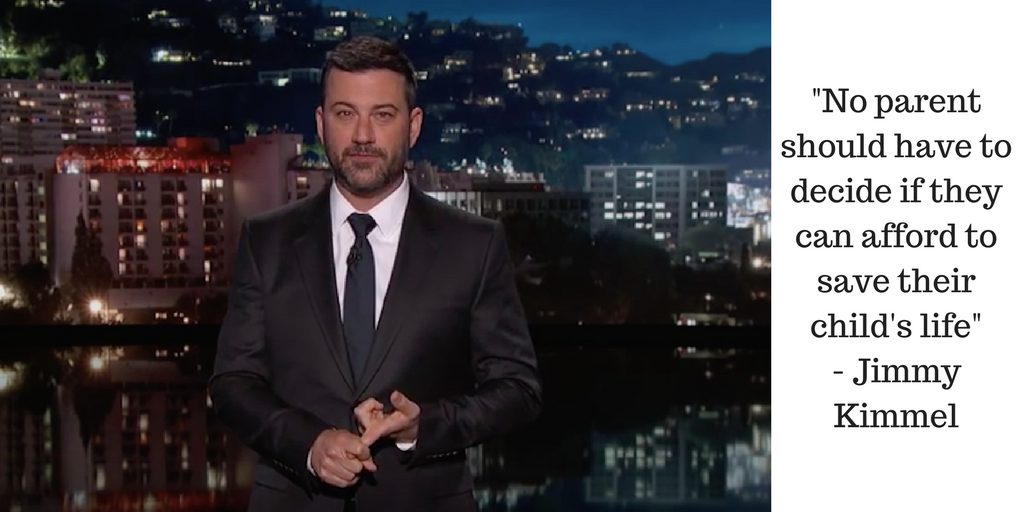
Child advocates embraced Kimmel’s words and were happy to defend him against false criticism of this statement because the special needs and challenges of children were neglected and ignored in the debate over health care earlier in the year. In both the House and Senate bills of that debate, proposals to slash Medicaid funding were written in a manner that would have disproportionately harmed children’s health.
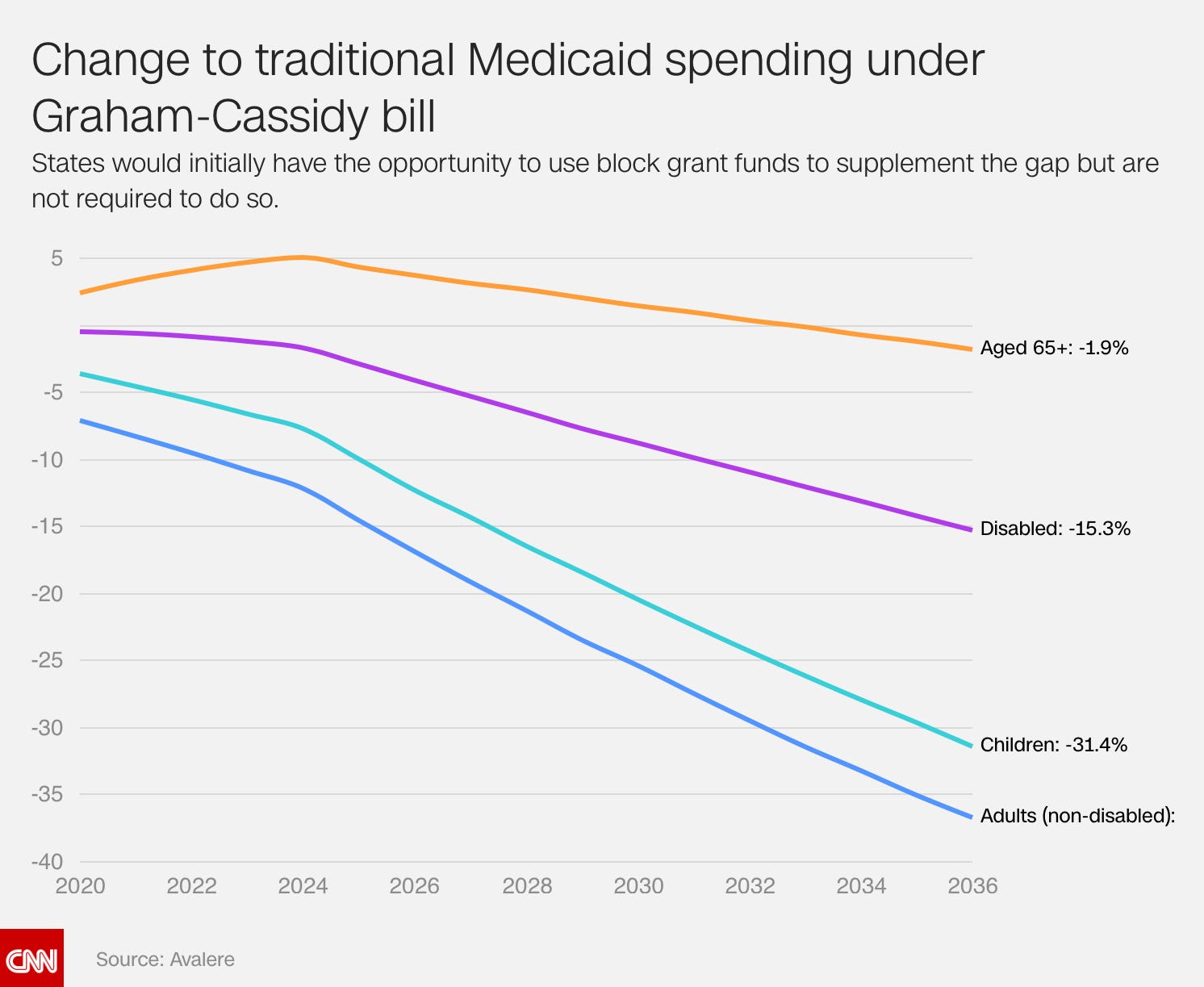
Since that debate, the health of children has been put at risk again when Congress allowed funding for CHIP, which cover almost nine million children and pregnant women across the country, to expire on September 30, 2017 — nearly three months ago.
Despite endless promises by Congress to child advocates throughout the year, legislation to extend CHIP has been repeatedly delayed as Congress has been distracted by other endeavors.
Not only has CHIP not been extended, but it was put on the backburner so that Congress could focus on tax reform, which has been arguably another disaster for children. As Ronald Brownstein writes in The Atlantic:
The House and Senate [tax] measures shower enormous benefits on households at the top of the economic ladder, a group that by all indications is older and whiter than the population overall. Then it hands the bill for those benefits largely to younger generations, who will pay through more federal debt; less spending on programs that could benefit them; and, eventually, higher taxes.
Jonathan Coppage, visiting senior fellow at the R Street Institute, adds:
The GOP tax plan will be very generous to middle-class families that make enough to capture the full credit on income taxes but will leave many working families that could most use tax relief lonely on the side of the road. My hopes for a pro-family conservative party will remain there with them.
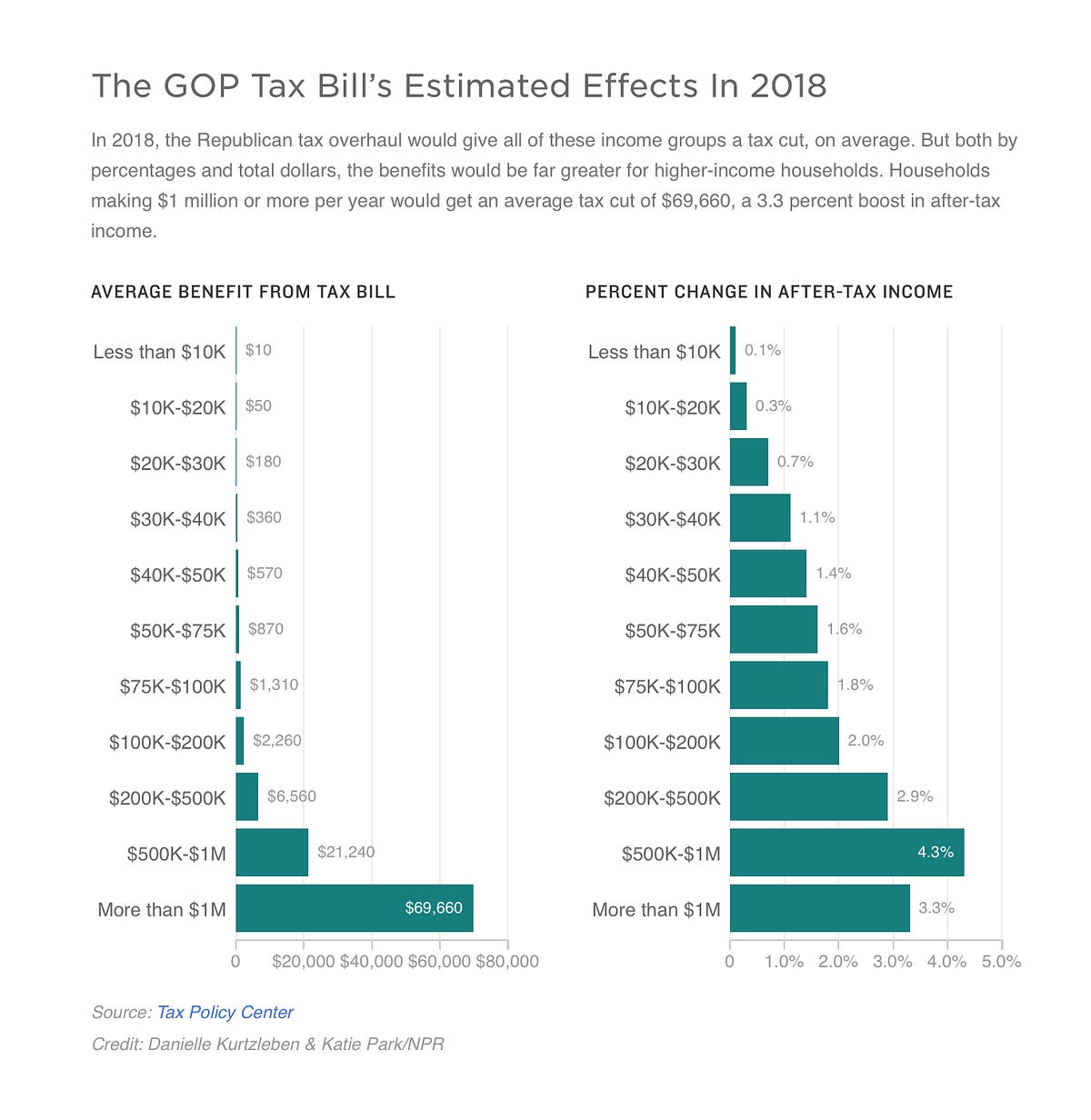
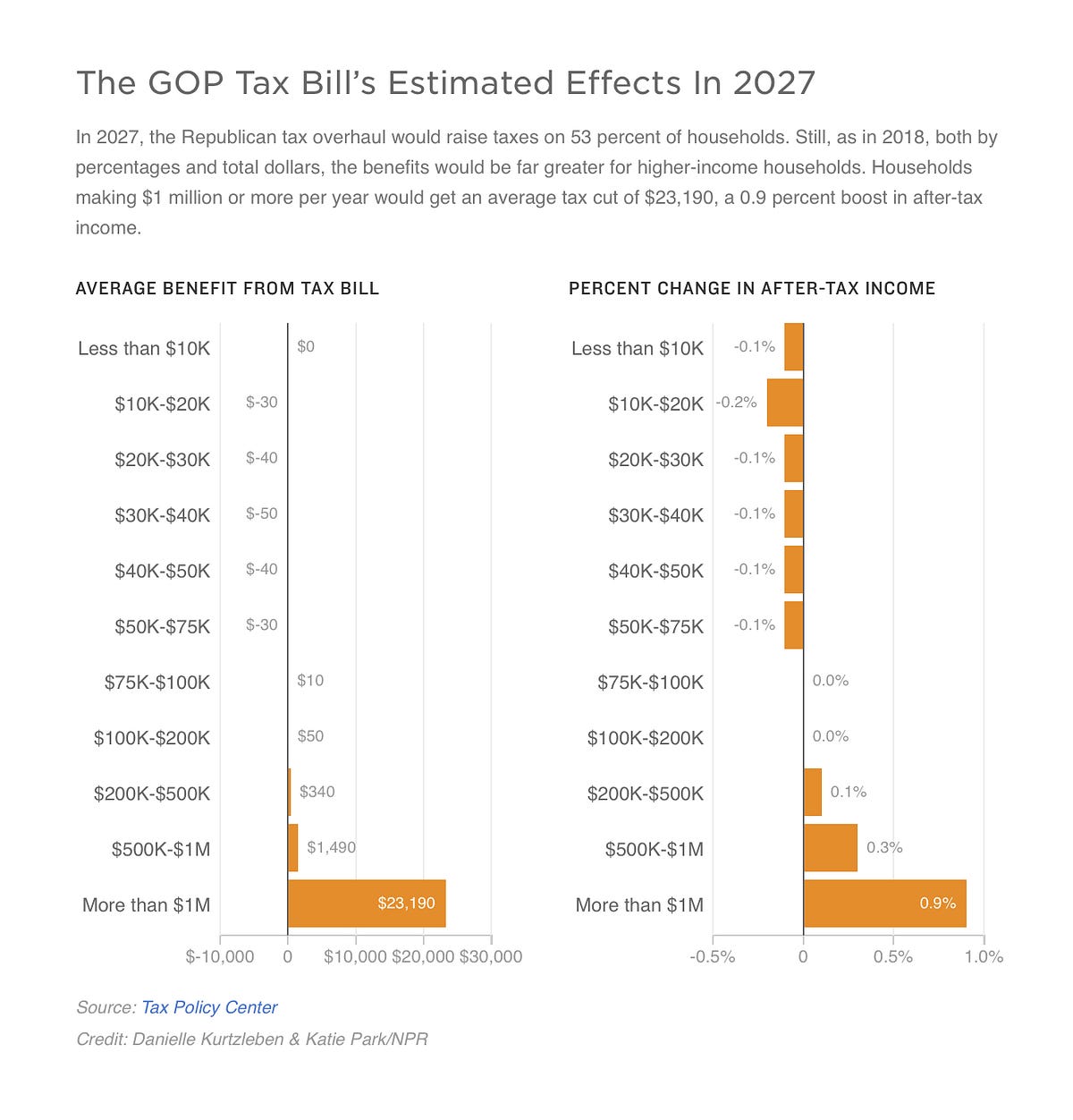
In effect, Congress has arguably been doing double-harm to children through both its action on tax reform and inaction on CHIP.
In response to these developments, Kimmel said:
[CHIP] almost certainly covers children you know. About one in eight children are covered only by CHIP. . . Now, CHIP has become a bargaining chip. It’s on the back burner while [Members of Congress] work out their new tax plans, which means parents of children with cancer and diabetes and heart problems are about to get letters saying their coverage could be cut off next month. Merry Christmas, right? This happened because Congress, about 72 days ago, failed to approve funding for CHIP since the first time it was created about two decades ago. This is literally a life-and-death program for American kids.
He continued:
It’s always had bipartisan support, but this year, they let the money for it expire while they work on getting tax cuts for their millionaire and billionaire donors. Imagine getting that letter literally not knowing how you’ll afford to save your child’s life. This is not a hypothetical: About 2 million CHIP kids have serious chronic conditions. I don’t know about you, I’ve had enough of this. I don’t know what could be more disgusting than putting a tax cut that mostly goes to rich people ahead of the lives of children. Why hasn’t CHIP been funded already?
Unfortunately, the Washington Post’s Glenn Kessler wrongly chose to disparage parts of Kimmel’s statement. Kessler writes, “Kimmel starts to go off the rails by suggesting that support is no longer bipartisan. . . Few lawmakers are really against CHIP; the question is how to fund it.”
Kessler misses Kimmel’s point that, if the program were truly a bipartisan priority, CHIP should have been extended months ago. In fact, the juxtaposition of Congress demanding $8 billion in offsets to extend CHIP, even though the legislation is merely an extension of current law, compared to using the Congressional Budget Act to waive $1.5 trillion in tax cuts for corporations and the richest people in society is astounding. The $8 billion in “required” CHIP offsets are less than 1 percent of the $1.5 billion in tax cuts that Congress has chosen not to offset and subsequent increased debt will be passed on to children to pay off.
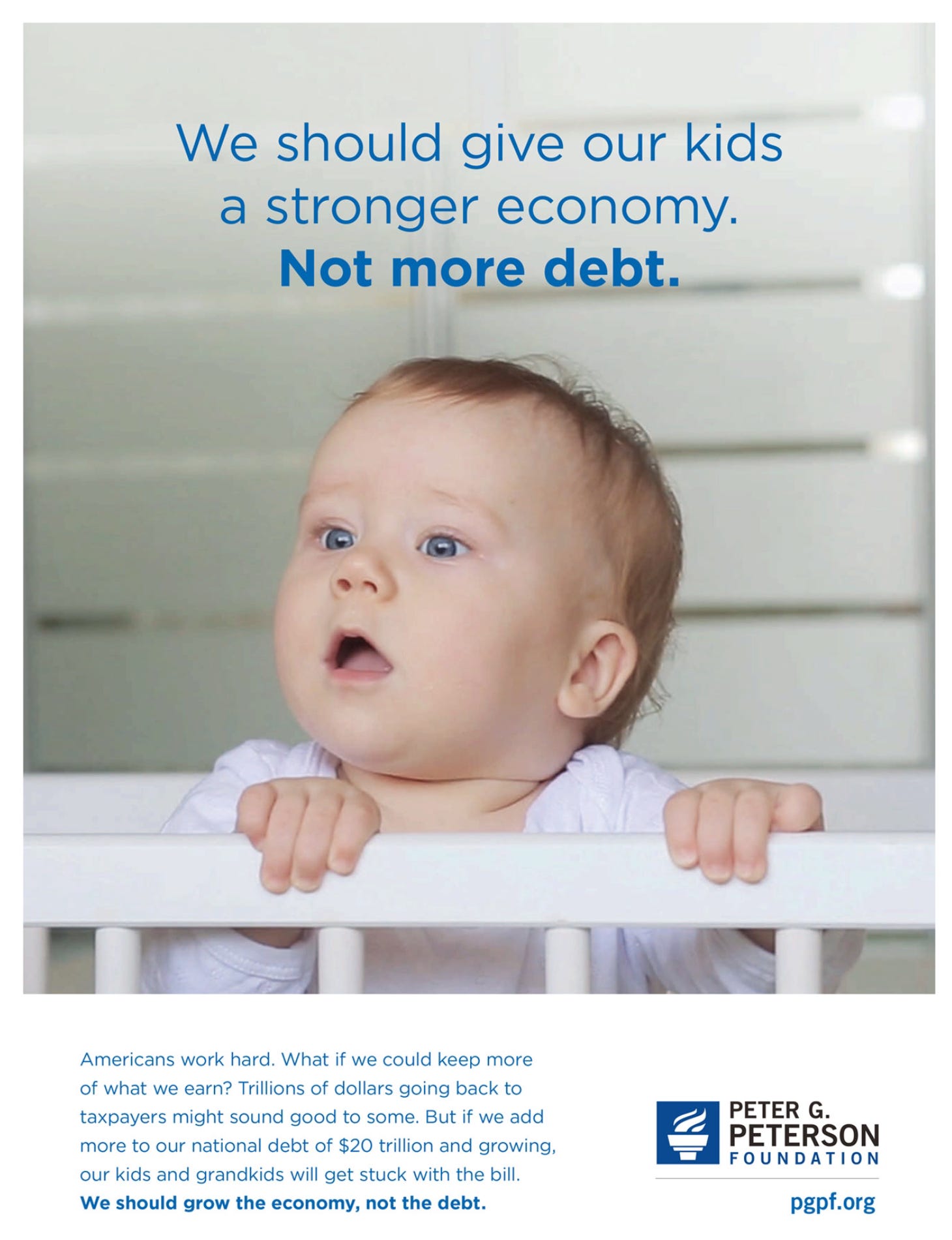
In short, despite Kessler’s criticism, there is no question that Kimmel is right to point out that Congress is “putting a tax cut that mostly goes to rich people ahead of the lives of children.”
The American public believes the priority should be the opposition. In the Kaiser Family Foundation poll, voters were more than twice as likely to say that President Trump and Congress should make CHIP a top priority (62 percent) than either reforming the tax code (28 percent) or repealing the Affordable Care Act (29 percent), even though Congress spent nearly the full year focused on the latter two issues while failing to extend CHIP funding, which expired at the end of September.
In another poll by Morning Consult and Politico, voters said, by an astounding 67–23 percent margin, that they believed CHIP was important enough to prompt a government shutdown until funding was renewed. We may be at that point now.
That leads to Kessler’s worst argument when he said that the “impasses over funding had led to some uncertainty in a handful of states, but there is no immediate crisis. . . .”
NO IMMEDIATE CRISIS?!
Frankly, the current situation is the exact opposition. Congress’s failure to extend CHIPs’s funding has become an absolute disaster to many states and families across the country.
With respect to the states, Governing’s Mattie Quinn reports:
. . .at least one state — Minnesota — had already exhausted those redistribution funds and resorted in the last few weeks to using its own money to make up for the loss of federal funding. Oregon was also anticipating having to tap its bank this month to keep the program running.
Other states are being forced to make similar decisions. Colorado Governor John Hickenlooper (D-CO) just requested nearly $10 million in emergency funding from the General Assembly’s Joint Budget Committee. According to Gov. Hickenlooper, “Vulnerable children and pregnant women are being used as bargaining chips. This request is not a cure. It’s a one-time only band-aid as we wait for Congress to do what’s right and secure CHIP funding.”
As Emily Piper, the commissioner of the Minnesota Department of Human Services, explains:
I don’t think Washington is working the way anyone in the country expects it to work right now. A dysfunctional Washington has real consequences for people.
Meanwhile, states such as Colorado, Connecticut, and Virginia have already sent out disenrollment notices to families whose children rely upon CHIP and others are planning to do so.
CHIP is being used as a pawn in larger debates and negotiations. It has fallen victim to the dysfunction and partisanship in Congress. And we are getting very close to the point where some children will also be victims.
Alabama is preparing to send out its own notices to families and is preparing to impose a freeze enrollment on January 1, 2018, and not renew any coverage after that date. Cathy Caldwell, director of the Bureau of Children’s Health Insurance in Alabama, explains:
It surprises me that it’s come down to the wire like this. We’ve been talking about the need for continuing funding for at least a year now, certainly with the anticipation that it’d get done before this point. What we’re asking for is a straight extension.
Caldwell is right, but the more amazing thing about that quote is that she said that three months ago. It was a problem then, but now it is having negative consequences for real families.
Earlier this week, Caldwell told reporters:
Our phones are ringing off the wall. We have panicked families wondering what in the world they have as options.
in Colorado, Heather Richter received a disenrollment notice from the State for her child Ari’s coverage. Ari suffers from Type I diabetes and was once transported by helicopter to save his life. CHIP is critical to his life and health. According to Richter:
It’s not a choice for us. We need this. We pay our mortgage, or we pay for the life-saving supplies my son has to have. We have to choose this first, or Ari would die without insulin.
Richter added, “I would just really hope Congress would look at this and look at these children and families and do what’s right.”
Sonja Reynolds, who is from Pleasant Grove, Utah, and has five children enrolled in CHIP, including two with Crohn’s disease, concurs. As Reynolds said in an event sponsored by First Focus on Capitol Hill earlier this week:
I am here to call on the Senate to do the right thing and invest in our nation’s true future, invest in the children, to save CHIP and to save children’s lives.
The crisis is both real and growing. In an Op-Ed in the St. Louis Post-Dispatch, Myra Gregory describes the threat that the CHIP funding expiration poses for her 11-year-old son Roland, who was diagnosed with lung cancer earlier this year. In the editorial, Gregory writes:
States across the country are already taking emergency measures to keep their programs operating. Nonetheless, many will be forced to begin notifying parents that their children will lose their CHIP coverage unless Congress restores funding for the program.
If Congress forces Missouri to drop Roland’s coverage, our family will be in an impossible situation. I don’t have the savings to pay for Roland’s care out of pocket. I don’t have family and friends — much less a bank — who will loan us tens of thousands of dollars for Roland’s treatment.
I understand that our society is divided right now. I understand that Republicans and Democrats can have honest differences of opinion. What I cannot understand is how the U.S. Congress could make the health security of kids like Roland a guessing game, and their lives bargaining chips. Watching my baby fight for his life this past year has been agonizing. I’ve held him in my arms while he cries in pain, I’ve experienced anxiety and stress I thought I would never overcome, and I have had to have conversations with Roland’s younger brothers that no child should have to have. I have always known that our situation could get worse, but I never imagined that Congress would be an obstacle in my son’s battle with cancer.
Congress should not be an obstacle and no parent should have to fear for their child’s health and well-being in this way. Their inaction is now dangerous.
As Sen. Bob Casey (D-PA) explained:
Some members of Congress are obsessed about getting the tax bill done. They’ve been waiting for this, some of them, their whole lives. They think it’s the most important thing in the world. But, my God, if you can spend months and weeks making sure that the corporate tax rate is just where it needs to be, so that you can satisfy corporate leaders, if you can tinker with that, and have tax breaks for the superrich, if you can work that hard, why is it so hard to get a bipartisan children’s health insurance bill done?
Congressional leadership say they care about CHIP and its future.
But children need action from Congress and not just words or tweets. They need congressional leaders to make the extension of health care funding for the nine million children that rely upon CHIP a priority NOW.
Nearly 1,000 national, state, and local organizations have written congressional leadership urging them to take immediate action to extend CHIP.
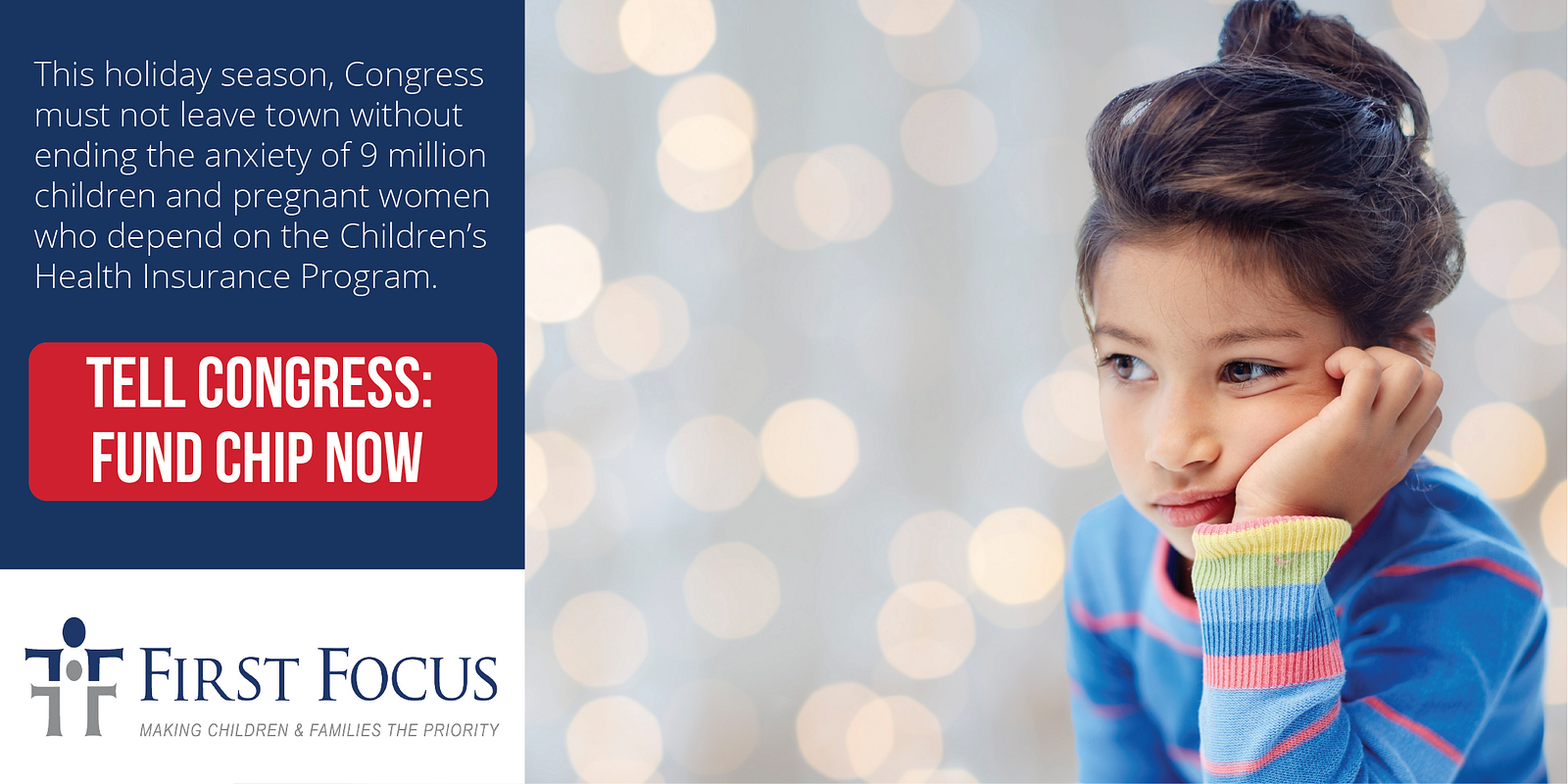
On a bipartisan basis, so have our nation’s governors. In a letter to congressional leadership at the end of November, the National Governors’ Association wrote:
CHIP is a Congressional success story to be celebrated — with the un-insurance rate for children age 18 and younger across the country dropping from 14.9% to 4.8% since first enacted. . . Absent congressional action, states will be forced to take steps including the notification of thousands of families of the loss of CHIP health care coverage. Taking steps to avoid those worst-case outcomes places a tremendous administrative and financial burden on states and sows confusion among vulnerable populations.
No member of Congress should leave for the holidays without taking care of our children. It’s as simple as that. Do the right thing this holiday season. Fund CHIP now.
We strongly agree and ask that you to call your two senators and member in the U.S. House of Representatives to demand that they extend CHIP in the next 48 hours before children are further harmed.
Children deserve better than such neglect.
